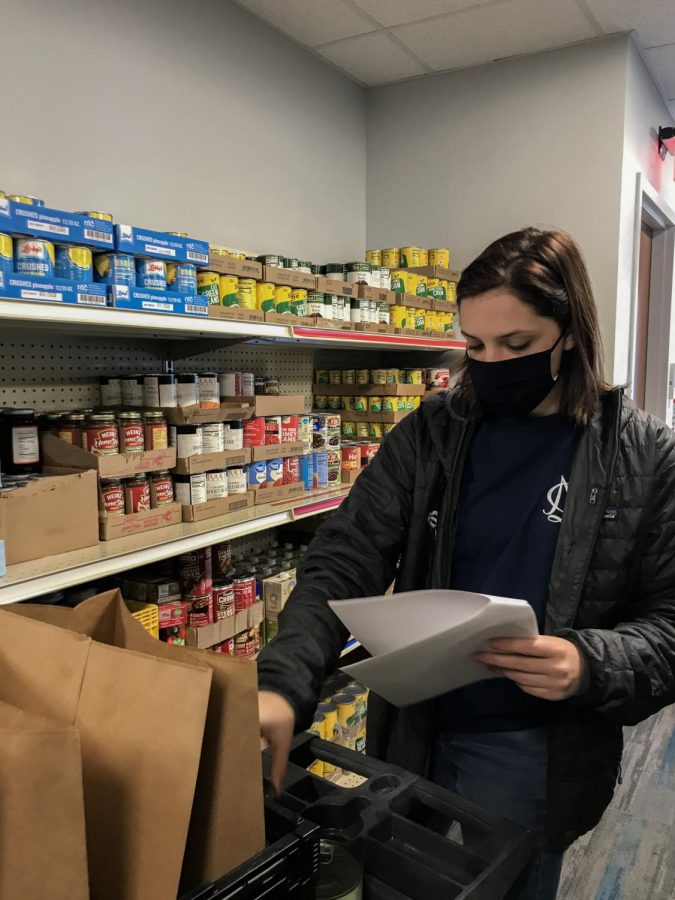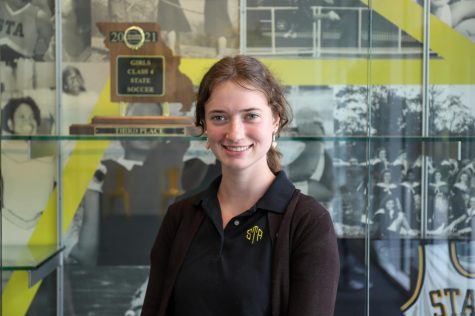Serving Stability
Food kitchens have remained open throughout the pandemic by adapting to safety guidelines.
January 25, 2021
“I’m not gonna lie to you to say that our job is easy every day, but it is very rewarding,” Bishop Sullivan Center’s food operations manager Doug Langner said.
The COVID-19 pandemic has created a lot of uncertainty, especially towards health. Food pantries and food kitchens are ensuring that their communities won’t have to worry about where their food comes from during the pandemic, creating a sense of stability. Bishop Sullivan Center has always provided three core services: food, jobs and aid. Their food kitchen, One City Cafe, serves lunch and dinner five days a week to anyone seeking a warm, chef-prepared meal.
“We were kind of under the model of running exactly like a restaurant,” Langner said. “So for people in need, they got a good meal every day on white China plates, full silverware, full service as if you were at a restaurant but, it’s a free meal.”
Bishop Sullivan Center purchases most of their food for One City Cafe to ensure that the meals are fresh and delicious. They rely on fundraising to pay for food costs. Luckily, many people want to help.
“I think people want to [volunteer] and help in these extraordinary times and so far, we’ve actually seen an increase in donations, especially monetary donations and that says something about our community of people wanting to help,” Langner said.
In addition to donations, Bishop Sullivan Center relies on volunteers to run their pantry and kitchen systems. However, they have had to restrict the number of volunteers to follow social distancing guidelines.
“Right now we need to go about four volunteers during our dinner service, before, it was 24 [volunteers] a night,” Langner said. “I mean, it’s a huge drop off but to do this right and to do this safe, not only for ourselves, but for the guests we serve and even the volunteers, we want to be a part of the solution with this unprecedented pandemic, and not a problem in it.”
The volunteers and staff make sure that their guests feel comfortable and safe by prioritizing their health and provide them with products and services that they might not otherwise have access to.
“So getting them three to four masks or being able to offer that or hand sanitizers and we were able to have a group come in to do testing early on when testing was really difficult to come by,” Langner said. “So we’ve been trying to do some things because we know the population we serve is at higher risk.”
St. Elizabeth’s food pantry has also made changes within their organization to better follow the safety protocols. Their social services director Teresa Medina has helped them with the transition to these changes, and they have not had to turn anyone away since the COVID-19 pandemic.
“The people don’t come in the building anymore,” Medina said. “We don’t have the big crowd just sit around visiting anymore. They come up one at a time so they are separated, you’ve seen the little cart. The hardest thing has been getting donations.”
St. Elizabeth’s pantry has not had to turn away any guests, but they have had to reduce the number of volunteers to follow safety guidelines, creating a surplus of volunteer workers.
“The volunteers are dying to come back because [everybody] wants to do something to help right now,” Medina said.
The St. Elizabeth’s food pantry is self-sufficient, meaning they get all of their supplies from donations and collection or drop-off bins.
“People just drop food in [the bins] and that’s kept us up and running, and the Girl Scouts do a little food drive so that’s very helpful,” Medina said. “We usually have three food drives at Hyvee, we’ve had one this year because they didn’t host food drives this year.”
Similarly to Bishop Sullivan Center, the St. Elizabeth’s food pantry helps provide aid to people in need.
“Utility assistance is another big one, kind of the biggest one,” Medina said. “Just being a referral or resource to help them find help, especially during the pandemic. A lot of people have never been in a situation where they need to ask for help and [they] didn’t know where to turn.”
Medina keeps up working with the pantry even though times get stressful. She keeps candy and Christmas decorations in her office to help inspire hope and positivity within herself and the people she serves.
“When I first started it was like ‘that could be me,’” Medina said. “It’s just a matter of circumstance that I happen to be where I am and where they have been, through no fault of their own, which I have discovered. They’ve just been dumped a different deck of cards and I just think [service] just brings us all together as a community.”
Jewish Family Services— JFS, has also had to switch to a drive up model due to the pandemic. Food pantry director Jo Hickey has worked with JFS for seven years and has seen several changes within the organization, specifically due to the COVID-19 pandemic.
“We have done a drive thru model where our volunteers go out and ask people what kind of perishables they would like, but they still receive a pre-packaged box or pre-selected box of non-perishable items,” Hickey said.
The drive up model was put into place to adjust to the growing number of clients and the social distancing requirements.
“We have more than doubled our number of families that we’re serving,” Hickey said. “We had plans to grow that number this year, but not quite as fast as we have.”
Jewish Family Services receives their donations from a variety of sources. The pandemic has increased the demand for these products due to the increase of families seeking help.
“We’re having to compete with grocery stores and vendors for products,” Hickey said. “I know that Harvesters has had some challenges to source things. But we’re all just getting more creative in how we connect with people in the community.”
JFS managed to adjust to the safety protocols quickly due the supportive staff members and volunteers’ teamwork and communication.
“We have a great executive team that pushes us to remain flexible and to set high goals,” Hickey said. “Six months ago, I would have said that what we’re doing right now is nearly impossible. They just keep pushing and saying we know you can do it, and you can figure it out and we’ll get there.”
Hickey understands the importance of helping yourself and your loved ones during hardship before you can help others.
“My goal is to be able to take time for myself,” Hickey said. “So that and for my team to be able to take time off as well so that we’re not getting burned out. This is a very physically mentally and emotionally challenging time.
COVID-19 has not stopped students from volunteering within the community. Senior Mary Katherine Gallagher regularly volunteers and has taken on leadership roles at STA to further her involvement with service. This year, she is President of G.I.V.E, assistant event chair for Relay for Life and is on the leadership team for Human Dignity club.
“I can put my all in, and I want to do the best I can to help whatever organization or club or extracurricular I’m in, so one of the easiest ways you can do that is in a leadership position,” Gallagher said.
Gallagher, along with the Board of Directors of G.I.V.E, are finding new ways to serve this year to better adhere to safety guidelines.
“I really promote with G.I.V.E, especially this year, that it’s not going to be so much projects where you go out and like go to Harvesters where we’re going to be bagging food,” Gallagher said. “What can I donate? Or what service can I offer that the service agency can utilize? Because if they can’t utilize volunteers in person, what can I do that then they can use themselves or make their job easier?”
Large volunteer opportunities have become scarce but the need for service has not gone away. Gallagher recommends to the people that want to go out to volunteer but are unable to, to look at service from a different perspective.
“It’s just anything you can do to make someone else’s life better or easier is service, so I would just say any act can be considered service,” Gallagher said. “And I would just say do as much as you can, whether that’s through little actions or big actions, it doesn’t matter, it’s all catered to the greater good.”




